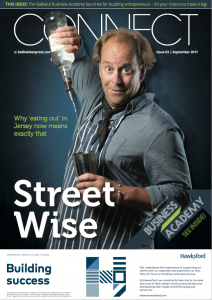
It’s fascinating how words and phrases change their meaning over time. The beautiful English language can be truly tortuous for those who crave the certainty of a dictionary definition or grammatical rule. What they were taught in primary school, and so which has become firmly entrenched as the ‘right’ meaning, or ‘correct’ way or writing, can then become no more than grains of sand slipping through their fingers as the incessant washing of general usage sculpts something entirely different.
For an example, take a look at our Adviser column this month (page 46) written by a local Advocate, Olaf Blakeley.
He focusses on a phrase which is becoming truly toxic in current local public discourse: “the Jersey Way.”
Even a few months ago, those three little words may have meant informality, a distrust of needless bureaucracy,
a strong community ethos, convivial hospitality or perhaps simply a love of life. All positive, if disparate, definitions – slippery little things, words.
The recent £23m Care Inquiry has abruptly and unilaterally redefined that phrase into something vaguely sinister, implying at best laziness, ineptitude or complacency, and at worst a systemic cover-up of one of the most despicable acts there is. And somehow it has made that synonymous with ‘Jersey,’ as if the smorgasbord of negative meanings newly encapsulated within ‘the Jersey way’ are in some way peculiar to the land between Gorey and St. Ouen.
There has been precious little political leadership with sufficient courage to challenge that redefinition of ‘the Jersey way,’ leaving it to individual media columnists like Advocate Blakeley to call a halt and question the direction of travel.
Why is it important to the business community? Simple. Because whether Jersey is our home, or our current place of work, we all have a common interest in its wellbeing, both socially and economically; as the further down you drill, the more you understand there is very little difference between the two.
Enjoy Connect, and think for yourself.